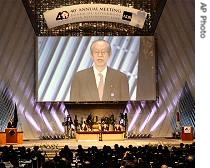2007年VOA标准英语-Asia Struggles to Balance Economic Needs Agains(在线收听)
Kyoto
06 May 2007
Japan is devoting a sizable sum of money to making Asia's use of energy more earth-friendly. Tokyo's announcement came at the meeting of the Asia Development Bank in the Japanese city of Kyoto, where bank officials and government leaders are struggling to strike a balance between the need for strong economic growth and the devastating environmental effects of fossil fuel consumption. VOA's Kurt Achin reports from Kyoto.

Japan's Finance Minister Koji Omi makes an opening speech at the 40th annual meeting of ADB at Kyoto International Conference Center in Kyoto, 06 May 2007
Japanese came here at the annual Asian Development Bank meeting, where ADB officials say the bank must reinvent itself to cope with a much wealthier and more energy-hungry region than the one the bank began lending to 40 years ago.
Asia's energy use has grown by 230 percent over the last 30 years of explosive industrialization. Asia now uses a quarter of the world's energy supply, compared with only 13 percent 10 years ago. And energy demand is expected to keep growing.
Supachai Panitchpakdi is chairman of an expert panel called the Eminent Persons Group, which last month issued a blueprint for the ADB's evolution. Supachai says the region's old model of growth at any cost is no longer feasible.
"Just growth is not enough. We still think that high growth is very important for Asia, but growth must be turned into environmentally sustainable growth," said Panitchpakdi.
At present, Asia relies mainly on fossil fuels for its energy, 41 percent of its needs are met by burning coal. But coal releases large amounts of carbon into the atmosphere, trapping heat and, scientists believe, fueling global warming.
Two days ago, a United Nations scientific panel warned that the earth would experience dramatic negative consequences, such as flooding, damaged agriculture, and water shortages, if urgent action is not taken to reduce carbon emissions.
Experts say Asia should take the lead on the problem, because the region is due to make huge investments in energy infrastructure in the coming decades. Um Woo-chong, who directs energy and sustainable growth for the ADB, says the bank is trying to help member countries choose the right options.
"We are targeting, in the ADB portfolio, starting in 2008, to have at least a $1 billion investment in clean energy," said Um Woo-chong.
Nevertheless, the ADB is also funding nearly $2 billion worth of coal-related projects in the coming year.
Um says sometimes the ADB has to balance its environmental goals with members' development needs. Coal is dirty, but it is also cheap and readily available.
"One of the key aspects is to ensure that there is energy security in many of these countries. And they oftentimes try to look for energy sources which are indigenous to their country, so they don't have to rely on outside forces," added Um.
Environmental groups like Greenpeace, not surprisingly, reject this pragmatic approach.
Greenpeace activist Athena Ballesteros says the ADB needs to show members how to think differently at the energy planning stage.
"Energy security is not just about coal, or oil, or gas. Energy security is about what happens to your country if climate change happens," said Ballesteros.
Activists say alternative energy can be just as economically sensible as fossil fuels. The challenge, however, lies in persuading private investors of that fact.
The International Energy Agency says Asia will need to invest some $16 trillion in energy infrastructure over the next three decades, which makes contributions from public entities like the ADB a drop in the bucket.